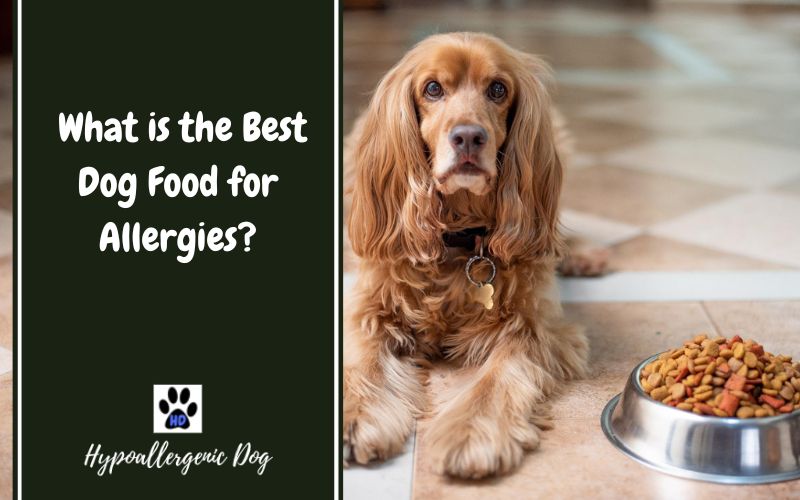Best Dog Food for Allergies
Just like humans, dogs can have intolerances and allergies to what they eat, which can make them quite ill if undetected. It’s often why you find concerned owners looking for the best dog food for allergies.
There are many symptoms of food allergies in dogs that could be upsetting your pooch. And, as the condition can’t be cured, it’s crucial for us as pet parents to find out what ingredient is causing your beloved friend’s issues — to remove it from their diet.
Dogs allergic to food are growing in prevalence among all breeds. Thankfully manufacturers have acknowledged this escalating issue, and now you can find allergy friendly dog food to help your pooch.
What Is the Best Dog Food for Allergies? Contents
Why Does My Dog Have a Food Allergy?
What Are Common Food Allergies in Dogs?
Signs and Symptoms of Dog Food Allergies
Dogs and Food Allergies Diagnosis
What Is the Best Hypoallergenic Dog Food?
Hypoallergenic Pet Food – The Basics
Dog Food Brands for Allergies
Dog Allergies to Food FAQs
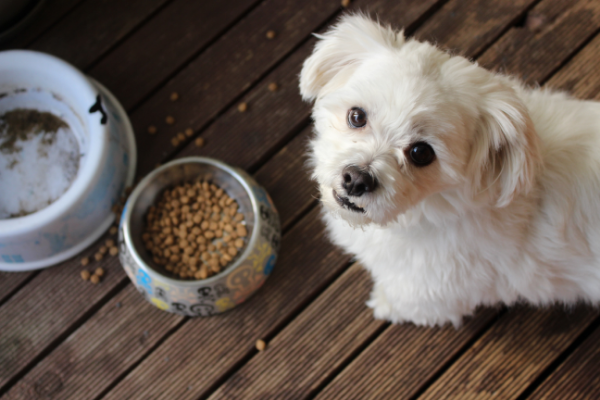
Why Does My Dog Have a Food Allergy?
Food allergies in dogs occur when the immune system believes that an ingested ingredient is foreign. The body tries to protect itself, sending the immune system into overdrive. Typically, allergies present themselves in puppyhood, but adult dogs can also become sensitive to certain ingredients.
So, to answer the question ‘can dogs be allergic to dog food?’ The quick answer is yes. That said, not everything in dog food can upset your canine. Foods containing proteins are usually the biggest allergen offender, but many dogs have also displayed reactions to less obvious proteins in wheat and grain.
As mentioned previously, the most common food allergy in dogs lies within the proteins of your pooch’s food. Anything containing dairy, chicken, beef, eggs, soy, or wheat can trigger a reaction.
You may be sitting and thinking, ‘chicken? beef?’ Yes, that’s right, some tail-waggers can develop dog food allergies to what we would usually expect them to thrive on. If your canine ingested any of these allergens, then this is when dog food allergy symptoms can occur.
Research has shown that some of the most common allergens in dogs are:
- Beef.
- Dairy products.
- Chicken.
- Wheat.
- Lamb.
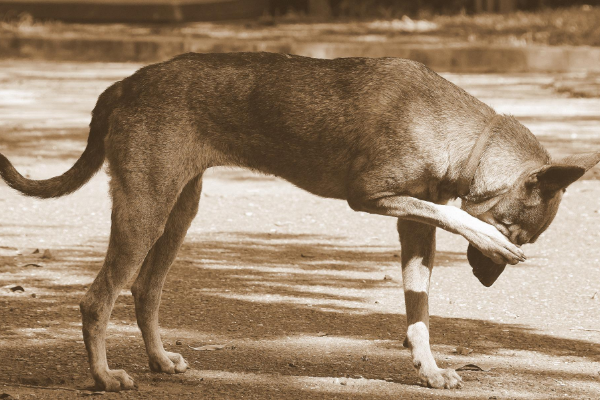
Signs Your Dog Is Allergic to Food
- Dog food allergies itching — if something appears to be irritating your dog more than usual, check they’re up to date with their flea treatment. If they are, turn your attention to their food. If untreated, they will be subject to balding spots, which will leave their skin red, angry, and hot to the touch.
- Rash — if you notice a rash near their chin, face, feet, ears, or groin area, this again, is a major flag of a food allergy in dogs.
- Vomiting — could either be down to something they’ve eaten that doesn’t agree with them, or a big signal that they’re having a reaction. Their body is trying to get rid of the irritant. Contact your vet if you suspect they have eaten something other than their own food.
- Diarrhea — isn’t the nicest of symptoms of food allergy in dogs by all means. Just like vomiting, your poor pooch is working hard to expel the ingredient they are allergic to.
- Gas — excessive flatulence goes hand in hand with the previous sign. However, it may not be followed by runny poops. If your dog has smelly bow-wow bottom burps, before you reach for the nose peg, turn your attention to their food.
- Upset tummy — can make your buddy feel lethargic, and lose their appetite. If we have a bad stomach, we don’t feel like running around or eating, the same goes for our pets! If you’ve noticed a change in their behavior, a trip to the doggy doctor should be on the cards.
There are many symptoms, but these are the main dog allergic reaction to food red flags. Puppy food allergy symptoms are the same as above.
After reading the food allergy symptoms in dogs, you may be wondering how to find out what is causing your pet so much discomfort. A food trial or elimination diet is the recommended way to figure out the offending allergen. Bear in mind that this needs to be overseen and reviewed by a vet. It’s in your dog’s best interest to be guided by a professional.
If you think your puppy has an allergy, extra care must be taken. A young dog’s body lacks the maturity to fight back. They can quickly and easily become dehydrated, and for a puppy, this can be life-threatening.
Food allergy symptoms in dogs are not isolated. Therefore, if your dog has some of these symptoms, completing a food trial will either rule out allergies or confirm them.
For a complete walk-through of what to expect, check out this guide on Dog Allergy Testing.
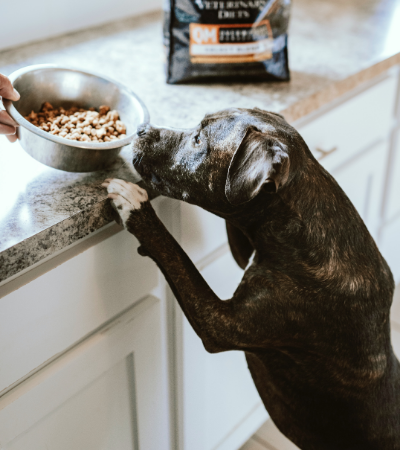
Hypoallergenic dog food is made using a handful of simple, wholesome ingredients and a novel protein type that isn’t usually found in ‘regular’ dog foods. For example, potatoes, vegetables, and proteins like fish, duck, or venison could be on the menu.
As these foods contain ingredients that most dogs wouldn’t have previously come in contact with, it helps to avoid triggers. Plus, keeping the ingredients to a minimum makes it more straightforward to track what’s going on your pooch’s plate.
The best hypoallergenic dog food totally depends on what ingredient you’re trying to avoid. Once you’ve identified what’s causing your dog to be unwell, you can start your search for your top hypoallergenic dog food.
Many brands deem themselves allergy free dog food but you must check the ingredients list carefully — they could contain alternative ingredients that may also upset your bow-wow.
Choice caters to a wide variety of needs — there are ranges for hypoallergenic puppy food, and you can also find allergy-specific dog food for skin allergies, grain allergies, and meat-free. You can find out more information by reading through our 101 on the Best Hypoallergenic Dog Foods.
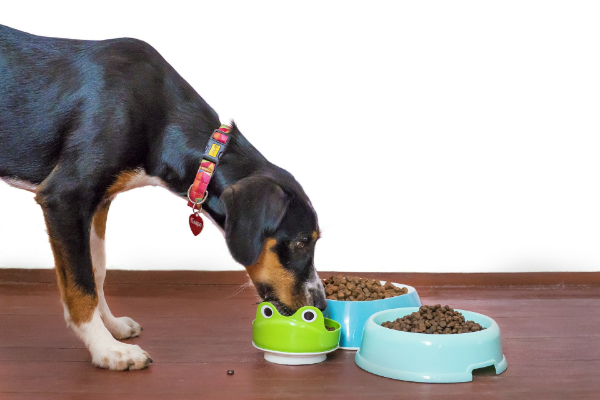
Conclusion
When my pup found her forever home with us, we researched the best dog foods, only to find out that she was showing a sensitivity to grain. We hunted for the best grain-free complete puppy food to ensure her tummy settled as quickly as possible.
In short, food-related allergens can be tough to pinpoint, and symptoms are predominantly linked to the digestive system. Plus, some of the most popular doggy dinners are most likely to trigger reactions.
But, the best dog food for allergies can help you either manage or get to the bottom of your pooch’s condition.
What Is a Good Hypoallergenic Dog Food?
For more information, take a look at our guide on the Best Hypoallergenic Dog Food.
How Can You Tell if Your Dog Is Allergic to Food?
Common signs of a food allergy in dogs are:
- Itchy skin, paws, or ears.
- Vomiting or diarrhea.
- Weight loss.
- Lack of energy.
- Frequent yeast infections.
Is My Dog Allergic to His Food?
If your dog displays any of the signs and symptoms mentioned above, first rule out if they have eaten anything other than their regular dog food. If they start to itch with sickness and/or diarrhea, it’s unlikely that it will be their food unless it has been changed recently.
How Long Does It Take for Symptoms To Start?
Typically, you can expect symptoms to appear anywhere between six to 24 hours after they have consumed the suspect food.
How Long Does It Take for Food Allergy Symptoms To Go Away in Dogs?
Once you’ve established the cause of your dog’s food allergy and have moved them to a new diet, it should take around eight weeks for the symptoms to clear up.
What Is the Most Common Food Allergy in Dogs?
For dogs, the most common food allergy is actually proteins. Most commonly beef, chicken, dairy, soy, or wheat gluten.
What Food Is Best for Dogs With Itchy Skin?
The best food for dogs suffering from itchy skin is a fish-based diet. This is because these types of food contain high levels of fish oil, which will help keep irritated skin moisturized.
What Do Vets Recommend for Dog Allergies?
Vets generally prescribe oral steroids such as prednisone and Temaril-P for the treatment of allergies in dogs.

